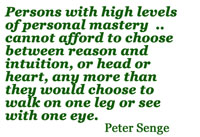Should You Go with Your Gut?

Have you ever had anyone ask, “what does your gut tell you?” or “Go with your gut!” When I was in 7th grade, a speaker from a non-profit violent crime prevention organization came to talk to us. I don’t remember everything she said, but one thing stood out to me then and still does today.
She said our gut instinct, that feeling inside our stomach that something isn’t right, or the prickly sensation you get on the back of your neck when someone is standing too close, or the sense of dread you feel when thinking of an upcoming event, is our intuition and we should listen to it.
Intuition is the ability to understand a situation without logic or reasoning. Many people make decisions based only on analytics, facts, processes, and analysis of information available. Those who use intuition make decisions based on emotion and cognition. They have a certain awareness of the environment and their place within it, they recognize cues and patterns in the world around them and use those cues when making decisions.
decisions based only on analytics, facts, processes, and analysis of information available. Those who use intuition make decisions based on emotion and cognition. They have a certain awareness of the environment and their place within it, they recognize cues and patterns in the world around them and use those cues when making decisions.
Personally, I have been relying on my gut as far back as I can remember. It was something that came naturally, and it has never steered me wrong. Not once.
Is Intuition Always Right?
The answer is yes, and no. Your basic, purest instinct or intuition is always right. However, once they are tainted with your thoughts and emotions, the validity and correctness of your instinct can be partially or completely wrong. When you learn to distinguish the difference between them you are more likely to be right. For some this ability comes naturally. Others just need a bit of practice.
Intuition is different than insight. Insight takes time to mature, is based on experiences and usually follows a gradual process. For example, you may be trying to solve a puzzle, and after two weeks of pondering about it, you gradually come up with the answer. You may not know where the answer came from, but you have it nonetheless. Intuition is instantaneous, informal reasoning that does not include any methodical calculation.
Many times, by following our initial reaction or gut feeling, we can save ourselves from a negative experience. However, once you begin thinking about the dilemma you face, the less likely the decision is based on true intuition.
How Does Intuition Work?
It works by something called an affect heuristic. In psychology, a heuristic is a mental shortcut that people use to make decisions quickly and efficiently. The affect is the feeling you have towards the situation. Your feeling (affect) influences the way you make decisions so thinking of a person as good, or a situation as bad will impact the decision you make.
The affect we have towards any given stimuli is made up of our experiences as well as general information that we obtain through day to day living. For example, you wake up late and miss your ride to class. You can either ride your bike or take the bus. You remember that the weatherman said it was supposed to rain this afternoon, so the bus sounds like the better plan. You solved the dilemma based on information you had (it is going to rain), and by the negative experience of getting rained on to come to the determination that you would take the bus.
 The answer to the problem comes in a split second. You do not actively think the process through; you just know that the bus is a better option than the bike.
The answer to the problem comes in a split second. You do not actively think the process through; you just know that the bus is a better option than the bike.
Your heuristic allows you to come to a solution to your problem pretty accurately which makes life easier.
How do You Identify True Intuition?
Your intuition can take many forms and may be different for each person. Visual imagery along with your senses (ears, touch, smell) and other sensitive areas such as your gut or your heart offer clues as to whether you are experiencing an intuitive moment.
The feeling arises without the use of logical processes which is difficult for many people to identify. We are used to thinking things through. Weighing the pros and cons then coming to a decision.
Sometimes we think we are experiencing an intuitive moment, but really, we are deciding based on wishful thinking, the things we hope will happen. Other times we may be projecting the outcome based on our history or ideas.
- Wishful thinking – I bought 100 lottery tickets from a nearby store where someone had won a small amount a few weeks before. My intuition told me that if I purchased 100 tickets, one of them would be the million-dollar winner (wishful thinking) and I already had decided what I would do with the money. The numbers were out, and I was devastated to see that not a single ticket was a winner.
- Projection – I had an exam in two weeks and based on the last test, my gut told me it was going to be difficult and I better study hard, so I did. The harder I studied the more I realized how much I didn’t know and knew all the questions on the test would be the ones I didn’t study. I knew I was going to do poorly. Test day came, and I stared at the paper. I had studied the right questions, but I couldn’t remember the answers. I failed the test. I projected my fear of failing the test onto the test which reinforced my fear of not passing it.
By tuning into your bodies responses, you can begin to recognize the sign of intuition. With true intuition, you feel a sense of relaxation, lack of doubt, inspiration, and excitement. You will just know that what you are doing is the right thing for you to do. 
If it is a projection, you will feel a sense of dread, of shutting down. You will become anxious and worried. Your body will know something isn’t as it should be.
Wishful thinking is more difficult to distinguish from true intuition because it also brings a sense of joy and excitement. The difference is wishful thinking is often paired with neediness, and your strong desire to see it come true.
With true intuition, there is a sense of detachment. You may be happy with the wonderful outcome, but you won’t feel like you made it happen.
Wishful thinking and projection are filled with thoughts about your history, dreams, hopes, and fears from all those old scars. Ask yourself if your decision is based on an image from your past or a wish that it will come true. That will often give you the first clue as to whether it is a true intuitive feeling.
“Intuition in its purest form is always right. Therefore, it is worth cultivating.” -Sharon Franquemont



Responses